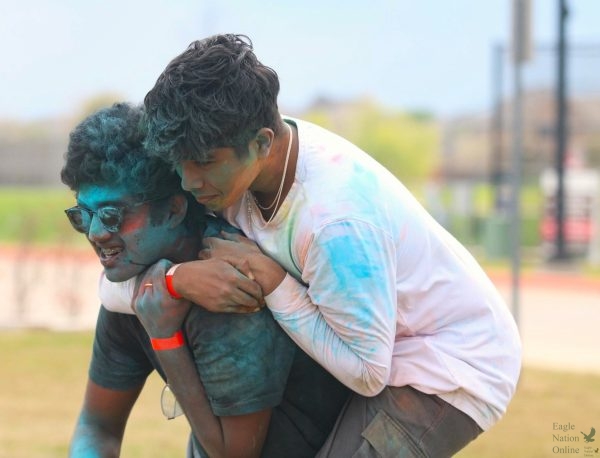Review: ‘Thappad’ portrays how domestic violence shapes lives of women
The digitally constructed image above shows the movie trailer for Thappad on a blazing background. Thappad, which means “the slap” in Hindi, is an Indian drama film that surrounds the decisions of three women after main character Amrita is slapped in the face by her husband at a party. “The movie is a very emotional look into the thoughts and feelings of a woman who is wondering whether she deserves to live a life of unhappiness,” junior Kalyani Rao said. “I felt like I knew these women and their stories intimately by the end of the movie.”
“Thappad” (The Slap)
“Thappad,” which means The Slap in Hindi, is an Indian film released in 2020 which surrounds the decisions made by three women and their connections to one another after the main character, Amrita (played by Taapsee Pannu), is slapped in the face by her husband in front of a group of people at a party.
The movie follows three women: Amrita, an upper-class housewife, Swati, her housemaid with a wildly abusive husband and Netra, a feminist lawyer with an egotistical and demeaning husband.
The opening scene is bright and colorful, showing Amrita rushing around the house and performing her daily tasks. She makes chai, waters the plants, turns off her husband’s alarm, cooks breakfast for him, takes his mother’s blood pressure, and more. She prepares his work files and his food before she even wakes him. Amrita is happy doing her tasks, and she dreams of moving to London with her husband’s prospected job promotion, but her husband shatters her cheerful and loving view of him when he slaps her in the face in front of everyone at a party, for trying to gently break up an argument between him and his coworker.
The tone of the movie instantly turns dark. Amrita sits in silence for days, having realized all of the little things that she does for her husband, Vikram, that he doesn’t appreciate. He refuses to apologize to her and instead explains how her reaction will reflect negatively on his reputation. A phrase repeated throughout the movie is “it was just a slap.” Even her mother explains to her how women need to be “flexible” to please their husbands, and how the happiness of a wife comes from the happiness of her husband.
However, Amrita refuses to stay silent. She seeks out feminist lawyer Netra, but Netra does her best to discourage her from getting a divorce. The status of a divorced woman in India means she can say goodbye to ever getting remarried, but Amrita stands her ground – if he hits her once, he will hit her again, and she had realized at that moment that Vikram did not respect her.
Her lawyer, Netra, experiences domestic unhappiness in a different way from Amrita. Her husband continuously undermines her accomplishments, “reminding” her that her success comes from being married to him, rather than her own skill as a lawyer. He also physically overpowers her and sexually assaults her in one scene.
Amrita’s battle for divorce is long and ugly, but it helps the women around her realize that they too deserve respect. Her maid, Swati, comes home to a drunk and physically abusive husband every night. Finally, she threatens to kill him if he does not beat her to death first. The ending of the film leaves it unclear what happened, but one thing is clear: Swati has obtained a freedom and spirit that she did not have before.
Amrita’s determination and strength – despite all of the people around her telling her to give up – help Swati and Netra realize that they too deserve happiness. As the movie closes, Netra leaves her husband for good and decides to start again in another city. Amrita parts from her husband and looks forward to a fresh start.
Violence against women in India
An estimated one in three women are victims of domestic violence in India. The fear of retribution for reporting domestic violence is so strong that the figure could be closer to two in three women. Domestic violence has been normalized in Indian society for a long time.
According to a UNICEF study in 2012, more than half of boys said a husband would be justified in beating his wife for one of the following reasons: his wife burns the food, argues with him, goes out without telling him, neglects the children or refuses sexual relations.
There are three main aspects of the patriarchal household structure in India that affect women’s agency: marriage, active discrimination by means of abuse (marital or extramarital) and diminished women’s agency through limited economic opportunity and through stifled opportunity for independence.
Women whose partners were unemployed, poorly educated or who drank were also more likely to have been subjected to violence from a partner, according to the Journal of Epidemiology & Community Health. This article’s evidence also stated that those who grew up in a household where they had witnessed their father hitting their mother were twice as likely to be victims of domestic violence as those who hadn’t.
According to a study published by the American Journal of Public Health, higher socioeconomic status for women reduces their chances of experiencing domestic abuse. The act of domestic violence toward women is an illegal act under Indian law. There is a growing recognition in many Indian regions that the nation can reach a higher potential through obtaining greater social and economic capital than by reducing women’s participation in society.
Domestic violence prevention in Texas
The Dallas Police Department receives an average of 42 domestic violence-related 911 calls every day, according to a report that the University of Texas at Dallas, which researchers wrote for the Dallas Domestic Violence Task Force.
Thankfully, Texas considers domestic violence a serious crime. Domestic assault carries both misdemeanor and felony penalties. They include assault and battery and range as far as kidnapping, sexual assault, and unlawful confinement. These charges make domestic violence one of the most severe crimes covered by Texas law.
I can’t help but think of the #MeToo movement when I write about Thappad. I wonder if the movie has helped some women realize they deserve respect and not violence, just like the #MeToo movement helped some women realize they had been assaulted.
Thappad is available for free streaming on Amazon Prime as of Dec. 8 2021.
Your donation will support the student journalists of Prosper High School. Your contribution will allow us to purchase equipment and cover our annual website hosting costs.

Honors, Experience and Awards:
5 Best of Sno publications.
5th place in Copy Editing, district UIL meet 2021
Honorable mention- Podcast interview, 2021 TAJE Fall Fiesta
UIL Journalist 2020-2021, 2021-2022
Quill and Scroll Society member 2021-2022
1st place in Copy Editing for CENTEX UIL meet 2021-2022
3rd place in Copy Editing for Aubrey UIL meet 2022
2nd place in Copy Editing for NorTex UIL District meet 2022
National Silver award for poetry from the Scholastic Art & Writing organization
National Recognition Award from College Board
AP Scholar with Distinction Award
2 Best in Texas News & Broadcast Awards, 2022: Personal Opinion Column- Honorable Mention, News Story- Honorable Mention
President of the Classic Book Club, 2020-onwards
Member of the National Spanish Honors Society (NSHS)
PHS Award for Academic Excellence in Newspaper II, 2022
Dean’s Scholarship for Cornell University Pre -College Program
Sibley Scholarship for Brown University Pre -College Program
CIEE Global Navigator Scholarship














